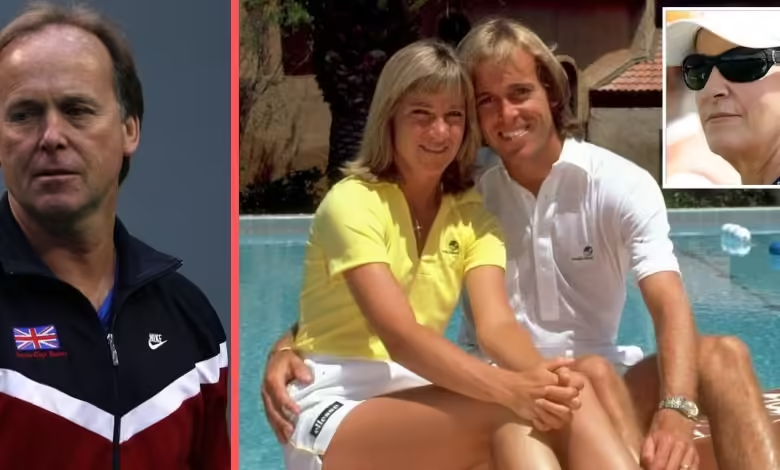“There was anger towards him in some ways, she wanted to please him” – When John Lloyd spoke about Chris Evert’s relationship with her father

In the realm of sports, the spotlight often extends beyond the athlete’s performance on the field to their personal lives and relationships. Such was the case with tennis legend Chris Evert, whose relationship with her father, Jimmy Evert, became a subject of scrutiny and fascination. John Lloyd, a former professional tennis player and Evert’s ex-husband, offered intriguing insights into the dynamics of their relationship, revealing a blend of admiration, frustration, and complexity.
“There was anger towards him in some ways, she wanted to please him,” remarked John Lloyd, encapsulating the nuanced sentiments Chris Evert harbored towards her father. These words evoke a cascade of questions and reflections regarding the intricate interplay between parental influence, personal ambition, and the pursuit of success. To fully comprehend the significance of Lloyd’s statement, it’s imperative to delve into the history and dynamics of the Evert family, examining how they shaped one of tennis’s most iconic figures.
Chris Evert’s relationship with her father, Jimmy Evert, was deeply intertwined with her tennis career from its inception. Jimmy, a renowned tennis coach, played a pivotal role in nurturing Chris’s talent and guiding her early steps in the sport. Under his tutelage, Chris emerged as a prodigious talent, showcasing remarkable skill and composure on the court from a young age. However, the father-daughter dynamic wasn’t devoid of its complexities.
As Chris ascended to the upper echelons of the tennis world, her relationship with her father faced the strains of heightened expectations, intense scrutiny, and the relentless pursuit of excellence. Jimmy Evert’s coaching style, characterized by discipline and meticulous attention to detail, undoubtedly shaped Chris’s approach to the game. Yet, it also laid the groundwork for a dynamic where Chris sought validation and approval from her father, even as she carved her path to greatness.
The sentiment of “anger towards him in some ways” articulated by John Lloyd sheds light on the internal conflict Chris Evert grappled with throughout her career. While she undoubtedly revered her father’s wisdom and expertise, there existed a tension born out of the desire to assert her independence and individuality. This tension manifested in various forms, from on-court decisions to off-court relationships, serving as a backdrop to Chris’s journey in the limelight of professional tennis.
Chris Evert’s achievements on the tennis court are nothing short of legendary. With 18 Grand Slam singles titles to her name and a reign of dominance that spanned over a decade, she etched her name into the annals of sporting history. However, behind the veneer of success lay a complex tapestry of emotions and relationships, chief among them being her bond with her father.
John Lloyd’s observation not only offers a glimpse into the inner workings of Chris Evert’s mind but also underscores the universal struggle for validation and acceptance, particularly in the context of familial relationships. The desire to please a parent, coupled with the pursuit of personal goals and aspirations, forms a delicate balancing act that many individuals grapple with throughout their lives.
Moreover, the intersection of gender dynamics adds another layer of complexity to the narrative. In an era where women’s voices were often marginalized, Chris Evert stood as a beacon of empowerment and resilience. Her journey serves as a testament to the transformative power of sport in challenging societal norms and fostering a sense of agency and autonomy.
The notion of “wanting to please” encapsulates a universal longing for affirmation and validation, transcending the boundaries of sport and permeating the fabric of human relationships. In the case of Chris Evert and her father, this longing played out against the backdrop of a high-stakes world where success was measured not only by trophies but also by the elusive quest for paternal approval.
It’s essential to acknowledge that the dynamics of parental influence are multifaceted and evolve over time. While Chris Evert’s relationship with her father may have been characterized by moments of tension and discord, it also served as a source of strength and resilience. Jimmy Evert’s unwavering support and guidance laid the foundation for Chris’s success, instilling in her the values of discipline, determination, and integrity that defined her career.
As we reflect on John Lloyd’s poignant words, we are reminded of the intricate dance between love and resentment, admiration and frustration, that defines the parent-child relationship. Chris Evert’s journey serves as a testament to the enduring power of familial bonds, shaping not only her legacy as a tennis icon but also her identity as a daughter, competitor, and trailblazer.
In conclusion, John Lloyd’s insights into Chris Evert’s relationship with her father offer a compelling glimpse into the complexities of parental influence in the world of sports. Through the lens of their dynamic, we gain a deeper understanding of the universal desire for validation and acceptance, as well as the transformative power of familial bonds. Chris Evert’s journey stands as a testament to the resilience of the human spirit and the enduring legacy of those who shape our lives, both on and off the court.



